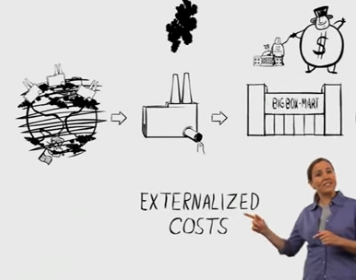For fourteen years now, since first producing The Story of Stuff in 2007, Annie Leonard has highlighted the wastefulness and ecological damage of a throw-away society, as well as the behind-the-scenes driving force of fossil fuel companies profits. The vast majority of products in modern industrial societies derive from petroleum, either as plastic items, plastic coatings, plastic packaging, or various chemicals and fuels. The corporations responsible try to maximize profits through a rapid replacement cycle, in large part by pushing planned obsolescence and single-use items. It’s called “throughput”, AKA “input/use/output”, by which petroleum is extracted, made into stuff, worn out, and discarded. The faster this materials extraction cycle can be driven, the greater the profits, and the more ecological and cultural damage occurs. This reality defines the classic opponents: the neo-liberal, laissez faire corporatists who want complete freedom, and the ecologically minded people who strive for community control and environmental protections.
Annie Leonard aligns herself with the environmentalists. She said in a Yes Magazine interview “Over the years, I’ve learned that we can’t solve the waste problem by working only on waste. We must examine the economic and cultural forces that drive such massive waste production” – Annie Leonard on Life After Stuff. And speaking about the approximately 8.3bn tons of plastics that have been produced worldwide since 1950 she said “Recycling alone will never stem the flow of plastics into our ocean. We must address the problem at the source” – Our plastic pollution crisis is too big for recycling to fix | Annie Leonard. We have to reduce the production plastics derived from petroleum, and keep petroleum in the ground. She has very creatively put her message into a series of videos in parallel to the Story of Stuff: The Story of Bottled Water, The Story of Microbeads, and The Story of Microfibers. Many others in the series can be viewed at – Movies Archives – The Story of Stuff Project.


Recent Comments